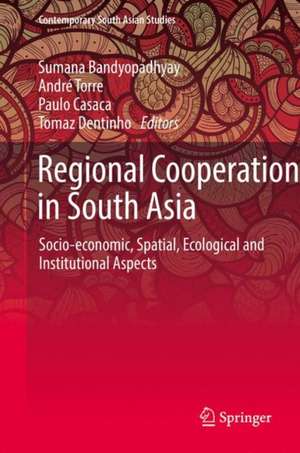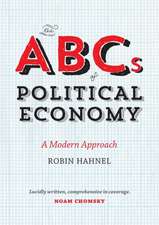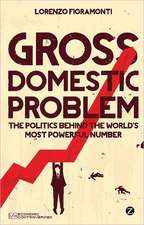Regional Cooperation in South Asia: Socio-economic, Spatial, Ecological and Institutional Aspects: Contemporary South Asian Studies
Editat de Sumana Bandyopadhyay, André Torre, Paulo Casaca, Tomaz Dentinhoen Limba Engleză Hardback – 6 sep 2017
This book highlights various challenges and opportunities for regional cooperation and development in South Asia. In light of the ongoing globalization process, the contributors investigate how socio-economic developments are changing the spatial organization of production as well as the profile of cities and landscapes, are stimulating the creation of maritime, terrestrial and aerial channels, and are putting increasing pressures on natural and environmental resources.
The book is divided into four parts: The first part analyses the increasing intensity of regional trade, migration and investment flows; the second focuses on channels and adapted spaces. The third part addresses sustainability and natural resources, while the fourth highlights institutional issues.
| Toate formatele și edițiile | Preț | Express |
|---|---|---|
| Paperback (1) | 790.66 lei 39-44 zile | |
| Springer International Publishing – 14 aug 2018 | 790.66 lei 39-44 zile | |
| Hardback (1) | 954.62 lei 6-8 săpt. | |
| Springer International Publishing – 6 sep 2017 | 954.62 lei 6-8 săpt. |
Preț: 954.62 lei
Preț vechi: 1164.17 lei
-18% Nou
Puncte Express: 1432
Preț estimativ în valută:
182.66€ • 191.74$ • 151.62£
182.66€ • 191.74$ • 151.62£
Carte tipărită la comandă
Livrare economică 10-24 aprilie
Preluare comenzi: 021 569.72.76
Specificații
ISBN-13: 9783319567464
ISBN-10: 3319567462
Pagini: 394
Ilustrații: X, 368 p. 30 illus. in color.
Dimensiuni: 155 x 235 x 26 mm
Greutate: 0.71 kg
Ediția:1st ed. 2017
Editura: Springer International Publishing
Colecția Springer
Seria Contemporary South Asian Studies
Locul publicării:Cham, Switzerland
ISBN-10: 3319567462
Pagini: 394
Ilustrații: X, 368 p. 30 illus. in color.
Dimensiuni: 155 x 235 x 26 mm
Greutate: 0.71 kg
Ediția:1st ed. 2017
Editura: Springer International Publishing
Colecția Springer
Seria Contemporary South Asian Studies
Locul publicării:Cham, Switzerland
Cuprins
Introduction.- Part I: Social and Economic Aspects in South Asia Interaction.- Part II: Channels and Adapted Spaces of South Asia.- Part III: Sustainability and Natural Resources.- Part IV: Institutions and Democracy
Notă biografică
Sumana Bandyopadhyay is professor at the Department of Geography of Calcutta University in India, specialized in Regional Planning and Urban Environmental Planning. She published books and scientific peer review articles as well as many interdisciplinary applied work on environmental, societal and development issues.
Paulo Casaca taught economics in the Azores and Lisbon universities. He was a member of the regional Azorean and Portuguese parliaments and a member of the European Parliament for ten years. He currently directs two international think tanks associations in Brussels and writes extensively on economics, terrorism and extremism.
André Torre is research professor at INRA (the French National Institute for Agricultural Research) and AgroParisTech. He is vice president of European Regional Science Association (ERSA), and Chief Editor of Revue d’Economie Régionale et Urbaine. He published thirteen books, fifteen special issues of scientific peer review articles as well as two hundred papers on the topics of proximity, innovation and regional development.
Tomaz Ponce Dentinho is a professor at the University of the Azores, Portugal in the domains of Regional, Environmental and Agricultural Economics. Since 2011 he is the executive director of the Regional Science Association International (RSAI). With his students and colleagues, he is the author of many newspaper articles, scientific papers and editor of several books.
Textul de pe ultima copertă
This book highlights various challenges and opportunities for regional cooperation and development in South Asia. In light of the ongoing globalization process, the contributors investigate how socio-economic developments are changing the spatial organization of production as well as the profile of cities and landscapes, are stimulating the creation of maritime, terrestrial and aerial channels, and are putting increasing pressures on natural and environmental resources.
The book is divided into four parts: The first part analyses the increasing intensity of regional trade, migration and investment flows; the second focuses on channels and adapted spaces. The third part addresses sustainability and natural resources, while the fourth highlights institutional issues.
Caracteristici
Highlights various challenges and opportunities for regional cooperation and development in South Asia Offers an interdisciplinary approach to study the regional effects of the globalization process Focuses on economic, environmental, infrastuctural and institutional aspects





















